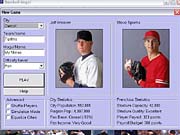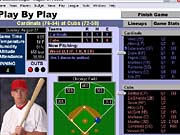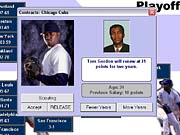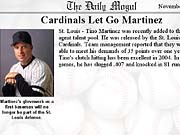Baseball Mogul was a bit of a revelation when it showed up in 1997. The first text-based baseball simulation to depict Big League life from the front office birthed many an armchair Steinbrenner. Although the absence of a publishing deal kept the game out of stores, online sales allowed a cult following to grow. Anyone who could tell the difference between Mickey Mantle and Mickey Mouse was playing it by midsummer, and by the following January a number of critics had named it the best sports game of the year.

But Baseball Mogul 2003 is a bit of a disappointment. What was once groundbreaking is now mundane, since this new game remains largely unchanged from what was so refreshing five years ago. Lead designer Clay Dreslough and the rest of the development team at Sports Mogul Inc. have been in a holding pattern for the past two editions of what's become a long-running series. New bells and whistles--such as an overhauled graphics engine and the return of a play-by-play mode that lets you watch games as they take place--do little to add depth or even alter gameplay in any appreciable fashion. It's impossible for any Baseball Mogul veteran to play the new game without getting the impression that it recycles elements of the old ones into a more attractive package.
Of course, looking and sounding good doesn't mean much to a sports management simulation. Baseball Mogul 2003 does look and sound pretty good, thanks to good use of color, some nice atmospheric sound effects, and official Major League player photos, but what really counts for a game like this is what's under the hood. And in that category Baseball Mogul 2003 is woefully underpowered. More-detailed rival baseball simulations on the market, such as Season Ticket Baseball 2003 (also known as Out of the Park Baseball 4), have put this game firmly in the rearview mirror. While the game still lets you take over a Major League franchise in any city you want (just not one of the Major League franchises, because the game comes without the Bud Selig stamp of approval) and run it however you want for as long as you see fit, many important elements are dumbed down or omitted entirely.

This is particularly apparent in player personnel moves. Just about everything involving your starting nine is satisfying in one way and dissatisfying in another. The play-by-play mode, for example, permits you to watch games but prevents you from making any in-game decisions. Although you develop youngsters in the minor leagues, you typically carry fewer than 10 because of budgetary reasons (there is no limit on numbers), and these players are little more than alternates grouped alongside benched big leaguers. The menu system lets you quickly access your roster, yet it doesn't support drag-and-drop for such processes as reordering your batting lineup and calling players up from the farm. Stat tracking collects numbers in at least two dozen categories, though you still can't check the splits to see how a player is performing against lefties and righties.
These collected statistics are generally respectable. Major League players typically perform to expectations. All of the stars are right about where they should be in every season, with only a few exceptions that can be interpreted as career-best or career-worst seasons. It's commonplace to see Pedro Martinez taking home the top pitcher prize, Edgardo Alfonzo putting up all-around MVP numbers, and Randy Johnson fanning 200-plus batters every year.
Team performances are more suspicious. Strangely enough, it's best to start with smaller-market teams when using the default rosters. They inevitably have a handle on their budget issues from the very beginning, and it's easier to start small and build big than it is to start big and contract to a point where you're financially solvent. Big-market clubs in New York, Los Angeles, and Chicago generally have only a couple of years to go all the way before their expensive player salaries catch up with them. And once the slide starts, it is very tough to stop. Go into the red at the end of a season and you'll be unable to sign players making more than the league minimum, which is typically everyone worth keeping around. Consequences are dire if this happens. You'll lose a number of your best players immediately and see the rest hit the road over the next year or two because your suddenly crippled team can't draw flies. And when you go into the basement in this game, you really go into the basement; let things go for too long and you'll wind up jealous of the Washington Senators' winning percentage, finishing up seasons with ridiculous (if not impossible) records like 4-158.

Odd financial elements might not cause eyebrows to rise as much as that above statistic, though there are problems here as well. Considering that the game is called Baseball Mogul, it's surprising that the basic financial mechanics aren't on a sounder footing. For starters, money doesn't exist. Rather than working with the cold hard cash that we all depend on in the real world, Baseball Mogul 2003 (like its two immediate predecessors) uses a points system. In place of salaried contracts, players are awarded points according to their talents. Unfortunately, these points never correspond with authentic values, meaning that Alex Rodriguez doesn't make 25 million points for a season--the equivalent of what he makes in dollars for the real-life Texas Rangers--he makes 125 points (each point apparently works out to $200,000). This lends an abstract air to everything and presents fans of Major League Baseball (presumably the target audience for this game) with an unnecessary learning curve that turns out to be steeper than it looks.
Contracts are overly simplistic in another way. When a player's deal expires, his agent goes immediately to his former team and sets out parameters for a new contract in terms of years and point value. You can adjust the number of years, which in turn affects how many points the player wants to stick around, or release him, but that's all you can do. This removes all of the drama from the signing period, since you know what the player will accept right from the beginning, and there is no chance of another club swooping in with a killer offer and stealing away his services.

How the game handles player contracts is crystal clear in comparison with how it handles other fiscal issues. As with player management, slider bars are used far too frequently. So while you can freely increase or decrease the number of points being spent on everything from hot dogs at your stadium to how much you're devoting to expenses like scouting, you cannot do this by simply assigning figures. Instead, every move you make is judged in comparison with what the rest of the league is doing. If you want to charge more or less for a ticket, or for concessions such as drinks and ice cream, you use slider bars. Everything is based on percentages above and below the league average. This makes the bottom line seem a bit unclear, since you're mostly dealing with percentages in place of exact figures.
Judging games based on preconceived notions of what they should be--rather than what they actually are--may seem grossly unfair, but it's hard not to do that with Baseball Mogul 2003. Anyone who came under the spell of the earlier releases can't help but feel let down that the series just hasn't lived up to its potential. The first game could have evolved into a classic sports management sim rivaling the likes of the UK's revered Championship Manager line. Instead, it's stuck in a rut, and fulfilling all of that initial promise is as far away as ever.